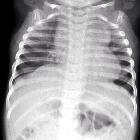Pectus carinatum








Pectus carinatum, otherwise known as a pigeon chest, refers to a chest wall deformity in which the sternum protrudes anteriorly. It is less common than pectus excavatum.
Epidemiology
Associations
- scoliosis (common)
- cyanotic congenital heart disease (uncommon)
- Marfan syndrome
- familial occurrence is reported in ~25%
Clinical presentation
Patients may present with dyspnea and exercise intolerance.
Radiographic features
A pectus carinatum may be demonstrated on lateral chest radiographs or cross-sectional imaging of the chest. There are two patterns of sternal protrusion:
- chondrogladiolar: protrusion of the middle and lower sternum
- chondromanubrial: protrusion of the manubrium and upper sternum (less common); known as Currarino-Silverman syndrome
Treatment and prognosis
Treatment options include non-surgical external bracing, typically for adolescents . Surgical repair usually results in symptomatic improvement with a variety of techniques include open Ravitch procedure, open or thoracoscopic minimal cartilage resection or the reverse Nuss procedure with success rates of ~90% (range 67-100%) .
History and etymology
Carina is Latin for keel (as in the hull of a ship) .
Siehe auch:
und weiter:

 Assoziationen und Differentialdiagnosen zu Pectus carinatum:
Assoziationen und Differentialdiagnosen zu Pectus carinatum:




